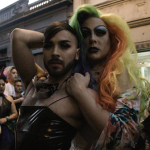What’s the best way to write alt text for artworks? Read our best practices guide. Continue reading

May 2, 2024
by Aesthetics for Birds
0 comments


May 2, 2024
by Aesthetics for Birds
0 comments
What’s the best way to write alt text for artworks? Read our best practices guide. Continue reading

November 17, 2023
by Aesthetics for Birds
1 Comment
The artworld is not a place of equality. But if we input bias, we can only get biased outputs. Continue reading

September 15, 2022
by Aesthetics for Birds
3 Comments
An analysis of the intricacies of how alternative text is used to communicate fundamentally visual information in a linguistic mode. Continue reading

September 1, 2022
by Aesthetics for Birds
2 Comments
An annotated list of books, essays, and lectures on disability, aesthetics, and art Continue reading

December 9, 2021
by Aesthetics for Birds
0 comments
Best practices for trans allyship, for institutions and for individuals. Continue reading

December 2, 2021
by Aesthetics for Birds
6 Comments
Why one professor uses circus skills to teach students about philosophy Continue reading
October 28, 2021
by Aesthetics for Birds
1 Comment
An incident at Slave Play shows what is wrong with philosophers’ obsession with distinctions Continue reading

October 22, 2021
by utahphilosoraptor
3 Comments
If Chappelle’s art dines on controversy, cancellation serves it dessert. Continue reading

October 8, 2021
by Aesthetics for Birds
1 Comment
Why overt or even subtle acts of adornment-based rebellion against cisnormativity make things better for everyone. Continue reading

October 1, 2021
by Alex King
0 comments
Netflix’s new comedy/drama gets some key things wrong about higher education, including its “sendup” of woke culture. Continue reading